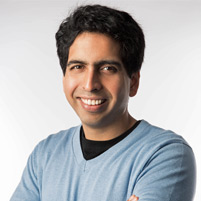"Edu"-preneur

Sal Khan
As a trained engineer, Sal Khan appreciates the importance of education.
So it seems counterintuitive that he has made it his life's work to give it away.
For his mission to provide a free, high-quality education for "anyone, anywhere," Khan, founder of Khan Academy, was selected by the Heinz Family Foundation as a 19th Annual Heinz Awards recipient. He delivered Simon Initiative Distinguished Lecture Series talk at Carnegie Mellon University on April 3.
The talk, titled "Education Reimagined," traced his rapid transformation from rising young hedge fund analyst to becoming perhaps the world's most well-known teacher. The lecture, followed by Q&A, took place Thursday, April 3, in Rashid Auditorium inside the Hillman Center for Future-Generation Technologies. A webcast of the lecture is available.
CMU President Subra Suresh delivered the opening remarks, and Andre Heinz of the Heinz Family Foundation provided closing remarks.
The Simon Initiative, announced by President Suresh in November, harnesses the decades of cross-disciplinary research at CMU linking cognitive models of learning with computational tools, all with the goal of improving learning outcomes for students of all ages, everywhere.
The son of a single mother growing up in Louisiana, Khan leveraged his talent for mathematics into a scholarship to attend the Massachusetts Institute of Technology where he earned a trio of degrees (bachelor's degrees in mathematics and electrical/computer engineering and a master's degree in electrical engineering) before completing a master's of business administration at Harvard University.
Even as his promising career in finance was gaining momentum, Khan literally became a "closet" educator. He transformed a closet in his Palo Alto, Calif., bedroom into a tiny office where he continued to grow and refine his side job of developing online math practice exercises and YouTube instruction videos for his younger cousins and family friends.
Khan first set out in 2004 to help his niece with her math by phone and an online interactive notepad. Soon he was tutoring 15 cousins and family friends and developing code to provide online practice exercises. When he put his tutorials on YouTube, demand exploded.
He convinced his wife that he should quit his hedge fund job to pursue his online education venture full time. Despite living in Silicon Valley, he decided against pursuing venture funding for a for-profit model, opting instead for the non-profit route. He still needed funding, though, to grow out of his bedroom closet.
By 2010, the funding started to flow beginning with billionaire venture capitalist John Doerr and his wife, Ann; the Bill and Melinda Gates Foundation; and Google, whose chairman Eric Schmidt serves on Khan Academy's board of directors.
Today, Khan Academy reaches more than 10 million unique students a month on topics ranging from basic arithmetic to college level calculus and statistics to the French Revolution. Khan recently struck a partnership with the College Board to develop free online tutorials for the SAT.
In recent talks, Khan has discussed how he is using data collected from Khan Academy students to continue tweaking his method of instruction. This process of iterative improvement is central to the philosophy of CMU's Simon Initiative.
Related Links: Heinz Awards | The Simon Initiative | Khan Academy
